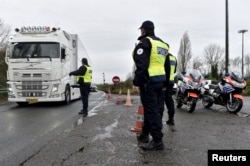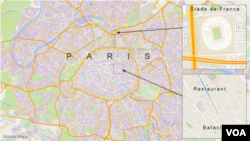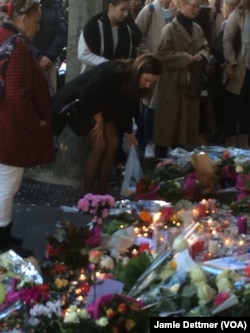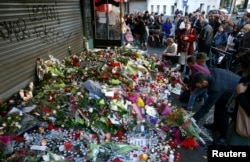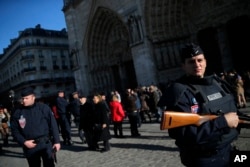French police have named the first of seven dead terrorists who carried out three deadly simultaneous attacks Friday across Paris. One of them – a 29-year-old French national – was a known petty criminal who was radicalized five years ago, officials say.
Another French national suspected of being an accomplice was arrested Saturday on the border with Belgium where some of the attackers, including Omar Ismail Mostefai, the first terrorist named, are believed to have been living.
Belgium arrests
Belgian authorities made a number of arrests Saturday in connection with the Paris attacks that left 129 dead and 352 wounded – the first arrests after Friday night's mayhem, a Belgian Justice Ministry spokeswoman said.
The arrests were made during raids on three houses in the Brussels suburb of Molenbeek-Saint-Jean after details of a car rented in Belgium and used by the attackers were passed on by Paris police.
French police said Omar Ismail Mostefai was identified by using imprints taken from a severed finger found at Bataclan concert hall, scene of the worst of the bloodshed.
“He was considered a radicalized person and had a security report,” Paris prosecutor François Molins told reporters Saturday night.
Mostafai spent several months in Syria in late 2013 and early 2014, a source close to the investigation said.
A second suspect was named by French media as "Abbdulakbak B.”
Known to police
The admission by the Paris prosecutor that Mostefai was known to authorities is likely to revive worries that the French security services are simply overwhelmed by the challenge posed by jihadists.
After the attack in January on the satirical magazine Charlie Hebdo, French intelligence and counter-terror authorities came under scathing criticism for having issued no advance warning of the planned terrorism, despite the fact that all the assailants were known to police and had come under some surveillance previously.
Paris prosecutor Molins was quick to stress to reporters that Mostefai had not been accused of terrorism in the past. He had a rap sheet with charges and convictions but had never received a custodial sentence, police sources told VOA.
'War type' weapons
Molins said the attackers used “war-type weapons” including Kalashnikov rifles and explosive belts containing TNT mixed with nitrogen peroxide.
He said closed-circuit cameras had led police to two vehicles used in the attacks, including the Belgian rental car, a VW Polo, which was found abandoned in Montreuil, an eastern suburb of the French capital.
“This is only the beginning of the investigation, we are collecting testimony,” Molins said. “At this point it is important to keep a number of the investigations secret.”
France’s BFMTV reported that Mostefai's father and brother and another relative have been taken into custody. It remains unclear if they had any involvement in the attack or prior knowledge.
Syrian passport found
Molins also confirmed a Syrian passport, belonging to a man born in 1990 who was not known to French authorities, had been found lying close by the bodies of two other jihadis who both blew themselves up in the course of their attacks.
In Greece, the citizen protection minister, Nikos Toskas, confirmed the passport holder had entered the European Union on October 3 through the Greek Island of Leros. He said: “We do not know if the passport was checked by other countries through which the holder likely passed.”
French police officials say the gunman with the Syrian passport traveled through after arriving in Greece through Macedonia and Serbia, where he applied for asylum on October 7.
Mostefai, French-born but of Algerian origin, lived for several years in Chartres until 2012, said Jean-Pierre Gorges, mayor of the town and a member of parliament. However, according to the Paris prosecutor, Mostefai comes from Courcouronnes, a southern Parisian suburb just 26 kilometers from Paris.
Police also conducted raids overnight Saturday on homes in Courcouronnes, Essonne and Romilly-sur-Seine.
Intelligence fumble
Mostefai's petty criminal background is also reminiscent of the backgrounds of the Charlie Hebdo gunmen, Said and Chérif Kouachi, and their accomplice, Amedy Coulibaly, who mounted an attack on a Jewish deli.
All had drawn intelligence attention but in the case of the Kouachis, who traveled to Yemen from 2009 to 2011 and were on both U.S. and British no-fly lists, French authorities decided in 2013 that they no longer presented a threat and were thought to be more interested in robbery and selling counterfeit goods.
A British security official told VOA that a similar intelligence fumble is likely to have occurred this time, too, but he emphasized that any failings identified will be a European-wide one.
“The origins, plotting, personnel and logistics that resulted in Friday’s attacks stretched across many countries and we all missed it,” he said. He spoke on condition of anonymity as he is not authorized to speak to the media.
But some analysts argue that Western media and the public need to understand that the intelligence services are just unable to provide full-proof security.
“Paris is also a warning that the best counterterrorist efforts in the world cannot protect any country, particularly the open societies in the West, from every attack; and that no victory against any given movement can be decisive,” said Anthony Cordesman, a security analyst at the Center for Strategic and International Studies, a Washington-based think tank.
Cordesman added: “The forces that have created violent Islamist extremist movements over the past decades – and that came home to Americans on September 11, 2001 – are simply too great for any lasting near-term victory in what some call the war on terrorism.”





